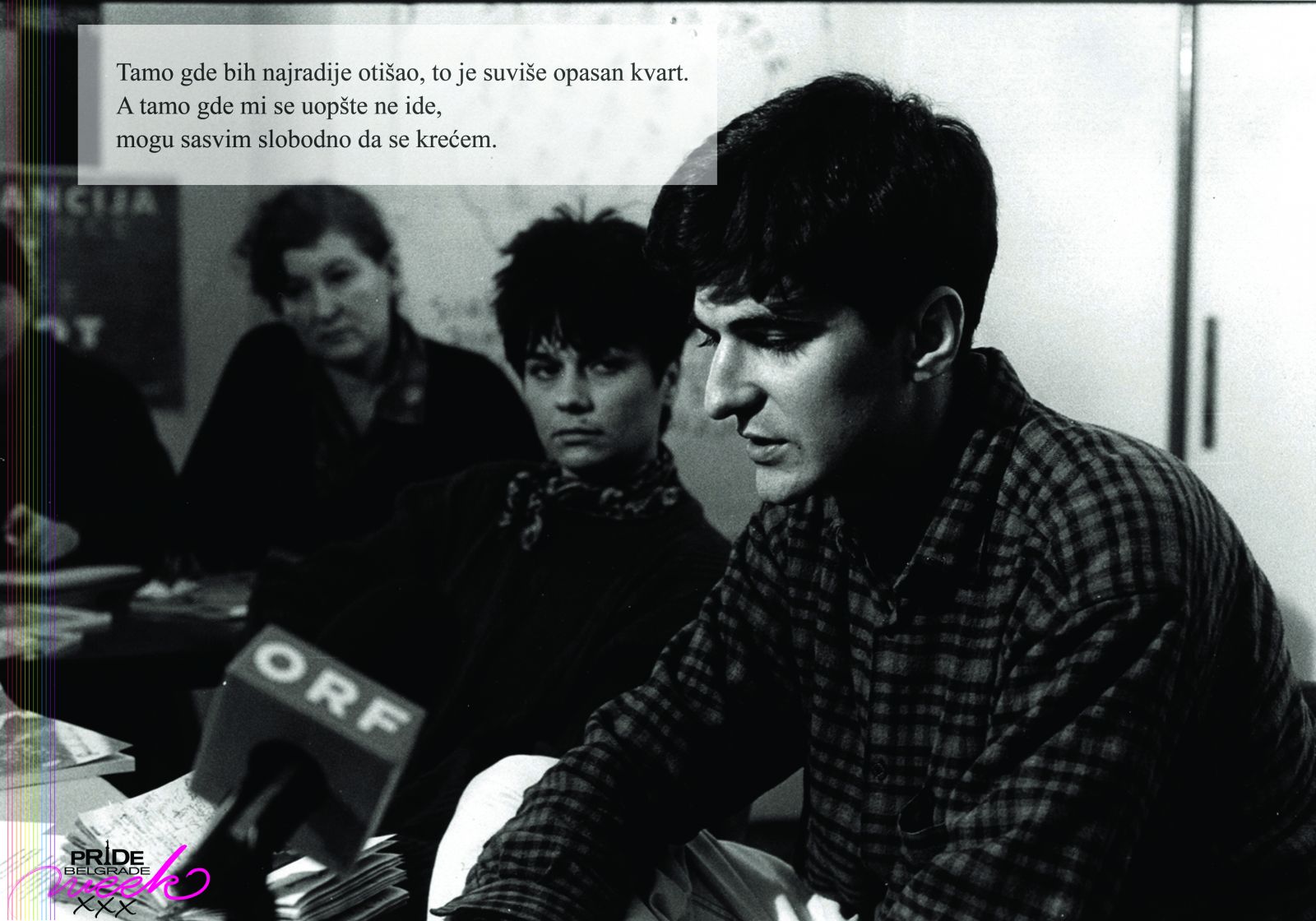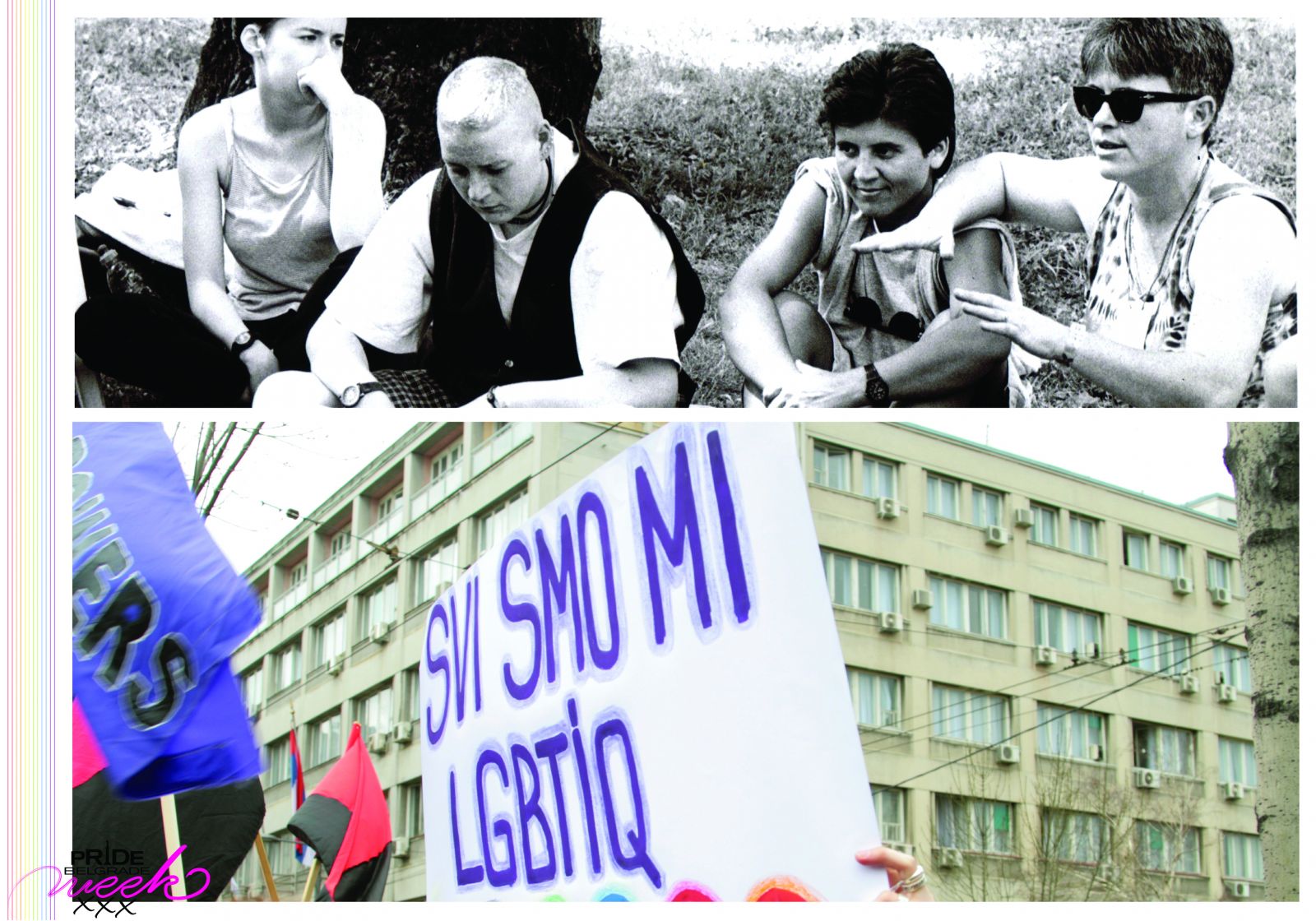09/05/2012 | Writer: Boban Stojanovic
‘It is oft forgotten that lesbians and gay men are present in all social strata: they are on the streets, in the media, in factories, the peace movement, in uniforms, as well as in all political parties, including also the members of the Socialist Party of Serbia.’
“It is oft forgotten that lesbians and gay men are present in all social strata: they are on the streets, in the media, in factories, the peace movement, in uniforms, as well as in all political parties, including also the members of the Socialist Party of Serbia.”
To make visible a socially-prohibited and stigmatised existence takes a great effort. This effort is even greater during the times of duress when a complete shift in, and annihilation of, civilian/democratic values occurs, as it was the case during and after wars on the territory of former Yugoslavia.
In its creation of a new national/collective identity, the ruling régime placed a ban on certain specific identities, gay and lesbian ones being on top of their list of undesirable ones. Yet, it was during the wars that the visibility of those identities was stronger than before or after the conflicts.
Activists of the peace movement in Serbia found it extremely important to make visible first and foremost a lesbian-gay solidarity which was manifested in manifold ways: by letters of support that came from all over the world, by help in staple foodstuff and clothing, and by the establishment of asylums for draft dodgers. Nevertheless, invisibility did its thing again, and the broader public remained unaware of many issues. This text is a small step to make visible the importance of gay-lesbian movement during the war.

What did activists do to empower LG movement during the war?
Even though it is hard to imagine, activists were making their identities visible. This was not an act of self-liberation, rather it has a broader context, surpassing the limits of “The One” and “The Same”, breaking through barriers of imposed fear, entering the identities of “The Other” and “The Different”. As one activist put it: “In a world sick with hate, violence, conflicts, wars with appertaining refugees, and poverty, workshops on the topic of lesbian identity were points of liberation, not only for lesbians themselves, but also for other women within the feminist and the anti-war movements. The transcripts from international workshops on lesbian existence, held by Women in Black, show that many non-lesbian women came so that they would meet lesbians, and to try to find values of equality in the stories by lesbians they were hearing for the first time. To discover the differences and to find moments of pride in personal histories was an imperative. As much as the cry for love was essential in the context of the historic moment, it was also a means of staving off the evil, inside which lesbians were living.
Especially important about the workshops was their international character. Lesbian and gay identity was the starting point of empathy, solidarity and support. At one of the Women in Black’s workshops, the activist from Belgium, Ria, indicates this clearly:
“We, lesbians in Belgium decided not to forget our sisters at the time of war… Sometimes my heterosexual
friends in the group warned me not to speak about my being lesbian, but this is not the peace movement as I imagine it. The ethics of the peace movement should be founded on the right of every woman and every man to publicly state and live their difference…”
Also interesting is the statement made by Rachel, an activist from England:
“We in the peace movement are supposed to give value to difference, because this is work towards peace culture which takes away the shame from the idea of being lesbian, feminist, a Moslem woman, a Serbian woman, a Roma woman, an Albanian woman. To me it is important to keep in mind what Charlotte Brunch says: ”No woman will be free unless she is also free to be a lesbian.”
All activities carried out towards realising lesbian and gay identity were based on the three premises, as presented by Lepa Mladjenovic in her Introduction to the Workshop on Lesbianism and Political Responsibility:
Firstly – all women at the workshop(s) are involved with the politics of peace, which includes the promotion of an ethics of differences.
Secondly, the feminist starting point about personal as political is understood.
Thirdly, women who love women are encouraged to accept their lesbian desire and to tell to themselves
and to the others that they are lesbians – something that is not always possible. It is important to underline once again that lesbians were involved not only in lesbian groups, but also in feminist, humanitarian, youth, anti-war, anarchist and other activities, and that in their work they selflessly assisted all people threatened by war in this region.
To the fact that such engagement achieved results stand witness many official and alternative awards, one of which – the Felipa da Souza award of the International Gay and Lesbian Rights Commission – was given to Lepa Mladenovic in New York in 1994.

Discrimination has many faces and, exposed to an incessant repression, the politically involved gay activists have taken measures to lessen the degree of discirimination, although it seemed that the time was not right for such actions. During the war, the Arkadija gay lobby was issuing statements pointing out to discrimination and to the existence of an LG population in all spheres of society:
“It is oft forgotten that lesbians and gay men are present in all social strata: they are on the streets, in the
media, in factories, the peace movement, in uniforms, as well as in all political parties, including also the members of the Socialist Party of Serbia.” (1)
In an another statement issued on the occasion of frequent misuse of the term “homosexual” by the Serbian Guard commander Ðorde Božovic, it reads:
“Women, homosexuals and lesbians create our history even though they are eliminated form historiography.
Women, homosexuals and lesbians are actively involved in all of today’s nationalist conflicts, wars and peace movements, even though that remains socially invisible.”
At times, the statements included outright humorous remarks:
“We would like to notice that it is very probable that more homosexuals are present in the Serbian Guard or in the Yugoslav People’s Army, than in Arkadija.” (2)
During the wars, within the feminist/anti-militarist group Women in Black, two gay activists founded a male support section. They initiated and supported the call for the right of conscientious objectors, protected all the men who perceived the wars differently, i.e. refused to be a part thereof. Some of the gay activists were very much involved with the creation of a Safe House for Draft Dodgers in Budapest. Being gay activists, conscientious objectors, anti-nationalists etc. those men were undergoing hardships and torture at the hands of state agents and institutions.
“One cannot speak about the existence of a movement for lesbian and gay male liberation in Belgrade, or indeed in Serbia, prior to the founding of the gay-lesbian lobby Arkadija. There were just occasional events, more or less important, that were happening now and then on the Belgrade gay-lesbian cultural scene, such as stage and art performances or the showing of occasional movies…” (3)
Arkadija was the first movement for liberation of lesbians and gay males from the hardships of patriarchy and a political exclusion. Later the group folded, having endured during the period of its activity much oppression and expulsion, including – most notoriously – being expelled from the premises that it shared with another group, composed of psychologists none the less, who used as an argument the then in force Article # 110 of the Criminal Code (banning same-sex intercourse between adults).
Yet, in the wake of those events, activists, both male and female, gathered again and again to found new groups which are still advocating the betterment of the LGBT population’s status in Serbia.
A political awareness that as The Other they live in a fascist state made gay and lesbian activists into actively involved into a fight for human rights. The fact that LGBT identity is invisible, and may appear even more so during, or in the aftermath of, conflicting situations may be a not too glorious, but strongly motivating reason to stay within the movement based on the idea of equality for all.
Even after the end of military conflicts, the war has not yet ended for gay men, lesbian women and all other Different People. An explosion of chauvinist hatred and homophobia at the occasion of the Gay Pride Parade in 2001, and a lasting discrimination with occurrences of violence find a fertile ground in the anti-values promoted by the politics of war.
That is why the LGBT movement must survive, as well as grow in strength and number, because “if People with a Difference are hiding, then society will claim that there is no oppression, and the oppressed themselves will behave as if they were not exposed to it.” (4)
Photographs: 20 Years of LGBT activism in Serbia: First there was a letter..."/Women in Black & Queeria Centre
1. Public statement, issued by Arkadija on March 23rd, 1992, on the occasion of Radoš Smiljkovic’s comment that gay organisations put a threat on the citizens of Serbia.
2. Public statement, issued by Arkadija on August 16th, 1991, on the occasion of the Serbian Guard commander Ðorde Božovic’s homophobic comments.
3. From Ivana Spasic and Dejan Nebrigic: “Lesbians and Homosexuals: Lauding the Difference”, in: Women for Peace, Women in Black, 1997.
4. Transcript from the workshop Lesbianhood and the Political Responsibility, quoted from the Women for Peace collection.
Tags:

